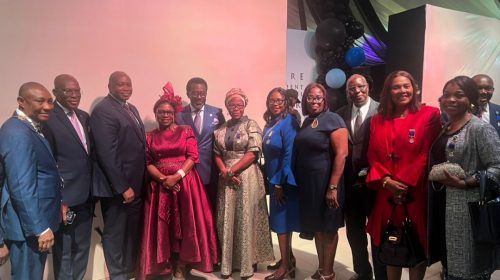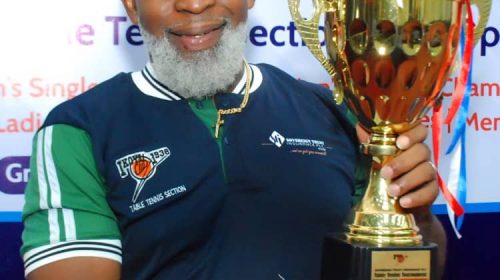A PAPER PRESENTED BY LAW UNION & ROCK CHAIRMAN, REMI BABALOLA’S AT BREAKFAST SEMINAR ORGANIZED BY CIIN
BEING PAPER DELIVERED AT BREAKFAST SEMINAR ORGANISED BY THE CHARTERED INSURANCE INSTITUTE OF NIGERIA BY MR REMI BABALOLA, CHAIRMAN BOARD OF DIRECTORS OF LAW UNION AND ROCK PLC
TITLED: MILLENNIALS: DIGITAL TRANSFORMATION AND THE NIGERIAN INSURANCE INDUSTRY
For reason best known to the organisers, they invited me as a Guest Speaker at today’s breakfast seminar. They also want me to talk on the millennials and the Insurance Industry. Am I supposed to talk as someone inside looking out or as someone outside looking in? However, the topic tickles me as the future belongs to those who see possibilities before they become obvious. I have tweaked the topic to “Millennials, Digital Transformation and the Nigerian Insurance Industry”.
Let us remind ourselves about some basic statistics; Nigeria has huge population of over 180million people and a N95 trillion economy. But the Nigerian Insurance penetration is less than 0.5% while Kenya and Ghana are 3% and South Africa is 13%. How do we penetrate the untapped market using technology and changing the narrative of Insurance from a want to a need? We have 92 million internet-enabled phones in this country, which presents unusual opportunity for e-commerce explosion.
Who are millennials, why are we talking about them and what makes them very unique and important? Generally speaking, people talk about older generation and younger generation to depict that there are differences in values and expectations between these generations. Intellectually speaking, a generation is defined by people who were born about the same time, experienced some life changing events that, to some extent, defined them and shaped their work values. These events may be political, social, cultural or economic and nowadays may even be technological. From a research study on millennials in the Nigerian workspace by Dr Franca Ovadje of Lagos Business School, we have four generations which are as follows:
The Veterans (Born before 1955)
• Pre Independence, colonial orientation influenced by tradition, hard work, values
• Stable environment
• Mainly agric
• Minimal external influence
Generation Xn (1955 – 1970)
• There was parliamentary democracy
• Independence in childhood
• Discovery of oil increased access to education and other things
• Period of change and political instability, war, coups etc
Generation Mn (1970 – 1982)
• Oil boom generation, Udoji awards
• Job hunting and hopping due to job insecurity
• Good and bad, SAP, Essenco, governments owing salaries, people losing jobs etc.
The Millennials or Generation Yn (1982 – …….)
The Millennials, also referred to as the Internet Generation, is best defined by the access to internet and the influence this has on their lives. The author of the 1991 book: “Generations”, Neil Howe and William Strauss coined the term ‘Millennials’ for individuals born between 1982 – 2000, and reached adulthood around the turn of 21 century. They have been shaped by technology revolution and the web is pivotal to their works and life. In China, they are called “ken lao zu” – the generation that eats the old; in Japan, it is Negara-zokie – i.e the people who are always doing two things at once.
They see life differently and have different expectations of work, they question status quo. They belong to communities on the internet – facebook, twitter, whatsApp, youtube etc. For career success, they focus on personal fulfilment and work-life balance. They want to work where there is creativity and everyone is treated equally.
They are easily bored; they want meaningful work. They multi-task and love variety. They want participative management style from their bosses. They want to run their own business in less than 12 years after graduation. Every organisation and sector needs the energy, creativity and commitment of millennials. Millennials currently comprise 35% of UK workforce and will be 50% of the global workforce by 2020. Like it or not, we can’t do without them. They own the future if not now!
Based on series of research that have been carried out on millennials in Nigeria, they are far away from the Insurance sector. They do not understand the value and proposition of the sector. The Insurance Industry must embrace a digital transformation with laser beam by changing customer relationships and experiences, redefining value propositions and optimising business models and processes. Apart from social networking, banking is the most frequently completed online activity by millennials. When asked about Insurance apps and Insurance linked investment/risk management activity, the response was poor. The Insurance industry needs to embrace the strategic significance of social channels. We need to be where the customer is and be part of the conversation where they interact, exchange opinions and levy complaints. When millennials visit your websites, what they expect are security first, speed and availability, easy usage and simple understanding, quality contents and ability to complete transactions with little or no physical human interface.
The following specifically highlight their character and attitude traits which insurance entities in Nigeria must take note of if they wish to win them over:
• Millennials’ affinity for technology is reshaping the retail space so much so that with product information, reviews and price comparisons at their fingertips, Millennials now turn to brands that can offer maximum convenience at the lowest cost.
• They want products that support their lifestyles.
• They distrust adverts and rely on friends for product purchase.
• They demand work-life balance.
• Many millennials live by the YOLO (You Only Live Once) philosophy, the philosophy emphasises the importance of living the “now” rather than planning for the future.
• Despite the YOLO stigma, they take important steps to get on a path toward a more secure and comfortable financial future, which makes them super savers.
• Just like people in older generations, millennials like to spend money. But where millennials outshine others is in budgeting — 78% say they follow a budget, as reported by Chase.
• They’re turning to a new set of services that provide access to products without the burdens of ownership, giving rise to what’s being called a “sharing economy.”
• They are more confident in challenging systems or questioning “the norm” of things
• As consumers, they demand a more sophisticated and personalised experience.
• They value companies’ interactions vide social media platforms that call for feedback on their services.
• They are constantly looking for companies that offer innovation and inter-connectivity within their products.
From the foregoing, it is safe to affirm that the Millennials are either critical success or failure factor for the insurance industry both locally and globally depending on how proactive the insurance industry harnesses their positive characteristics. Proactive adaptation of their lifestyle or behaviour to innovate products by insurers to match their lifestyle needs will significantly change the landscape of the insurance industry.
On the flip side, the lack of online presence by insurers in the digital space to actively engage the Millennials may significantly undermine growth in the insurance space. Quoting Goldman Sachs, one of the largest generations in history is about to move into its prime spending years. Millennials are poised to reshape the economy; their unique experiences will change the ways we buy and sell, forcing companies to examine how they do business for decades to come.
According to ‘Think With Google’, in a moment of need, 87% of consumers turn to search engines first. If your brand doesn’t show up in search therefore, Millennials are not likely to take you seriously.
The foregoing references should get the insurance industry thinking on how to capture the huge Millennials market by migrating from its operators’ current traditional media of engaging its customers. Any insurer not willing and prepared to explore the Millennials population segment should be prepared to lose its share of the existing market. On the other hand, any insurer prepared to engage and offer varieties of innovative products that match the lifestyle of the digital natives is likely to be a market leader.
One of the success factors that will determine whether an insurance brand will continue to be relevant in this age and time is its active online presence and visibility and brand invigoration to appeal to the young, productive tech-savvy segment of the Nigerian population. With 92 million segment of the population as active users of the mobile phone, insurance business communication need to change from the conventional media of advertising to digital media in order to achieve phenomenal growth in the insurance industry and financial service sector. Information available shows that the Millennials have the capacity and are in fact influencing purchasing decisions as well as how companies conduct business. Insurers must therefore be ready to tailor their marketing strategies to align with the digital natives in order to achieve improved performance.
Insurance companies would need to allocate resources to study millennials’ habits and employ effective marketing strategies to sell multiples strands of insurance. Since they engage in a sharing economy, we may need to think of how to insure space and time.
How should Insurance companies market millennials? Be where they are. According to Neustar, an American technology company that provides real-time information and analytics for the Internet, telecommunications, entertainment, and marketing industries, 54% of millennials say that their mobile device is the most important shopping research tool versus 31% for desktop, 8% for television and 7% for print.






Leave a Reply